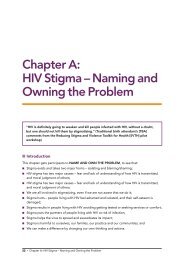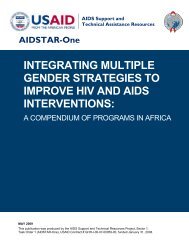Guide for Community Assessments on Women's Health Care - ICRW
Guide for Community Assessments on Women's Health Care - ICRW
Guide for Community Assessments on Women's Health Care - ICRW
Create successful ePaper yourself
Turn your PDF publications into a flip-book with our unique Google optimized e-Paper software.
Sessi<strong>on</strong> 1: Introducti<strong>on</strong>s and Breaking the Ice<br />
Target Groups: ALL<br />
Facilitator’s Note: During this opening sessi<strong>on</strong> you are trying to make every<strong>on</strong>e feel welcome and<br />
understand what you would like to achieve during the <strong>on</strong>e-day workshop.<br />
Things to guard against: Explain how the in<str<strong>on</strong>g>for</str<strong>on</strong>g>mati<strong>on</strong> from the sessi<strong>on</strong> will be used – <str<strong>on</strong>g>for</str<strong>on</strong>g> instance,<br />
to help MPs make changes to improve health services and women’s access to health; or help civil<br />
society or other organizati<strong>on</strong>s advocate around women’s health issues. Explain what the workshop<br />
will do and what it will not do (e.g., the workshop will not pay people <str<strong>on</strong>g>for</str<strong>on</strong>g> their participati<strong>on</strong>).<br />
Objectives:<br />
●●<br />
●●<br />
●●<br />
●●<br />
Break the ice, put participants at ease and get them talking.<br />
Underscore the importance of the workshop and how participants will benefit.<br />
Resp<strong>on</strong>d to participants’ expectati<strong>on</strong>s and correct any false expectati<strong>on</strong>s.<br />
Agree <strong>on</strong> basic rules <str<strong>on</strong>g>for</str<strong>on</strong>g> the <strong>on</strong>e-day workshop and how to en<str<strong>on</strong>g>for</str<strong>on</strong>g>ce them.<br />
Time: 30 minutes<br />
Materials: Registrati<strong>on</strong> sheet. Name tags.<br />
Steps:<br />
➊ ARRIVAL ACTIVITY (Registrati<strong>on</strong> and Rhyming Name Tags): As participants arrive, ask them to<br />
write their name <strong>on</strong> the registrati<strong>on</strong> sheet and make “rhyming” name tags – their own name plus<br />
an adjective starting with the same letter, e.g., Crazy Christine, Magical Mary, Sexy Sara. If they are<br />
illiterate, help write the names. This activity involves every<strong>on</strong>e when they first arrive, creates some fun<br />
and helps to build a relaxed atmosphere.<br />
➋ WARM-UP AND INTRODUCTIONS (10 minutes): Organize a warm-up game to break the ice, get<br />
participants interacting, and prepare <str<strong>on</strong>g>for</str<strong>on</strong>g> introducti<strong>on</strong>s and expectati<strong>on</strong>s. See Annex B <str<strong>on</strong>g>for</str<strong>on</strong>g> possible<br />
warm-up games.<br />
Warm-up Game – “Fire! Fire!” Ask participants to stand up and walk in any directi<strong>on</strong>. When you call<br />
“Fire! Fire!” and a number, participants get into groups of that number. Call out two to start with,<br />
then three, then four, then two. When you back to having pairs, ask each pair to do two tasks–<br />
a) Find out two things about each other (e.g., three grandchildren and likes to dance).<br />
b) What do you expect to learn or do during the workshop?<br />
Introducti<strong>on</strong>s: Bring the group back together in a circle and ask each pers<strong>on</strong> to introduce his/her<br />
partner – rhyming name and two things. As part of these introducti<strong>on</strong>s, introduce yourself, the<br />
recorder and the logistics organizer, and ask the MPs to introduce themselves, using the rhyming<br />
names.<br />
➌ EXPECTATIONS (10 minutes): Go around the circle and ask each pers<strong>on</strong> to give his/her<br />
expectati<strong>on</strong>s from the workshop.<br />
Note: This round of expectati<strong>on</strong>s can be repetitive, but it also can bring out important in<str<strong>on</strong>g>for</str<strong>on</strong>g>mati<strong>on</strong><br />
and identify expectati<strong>on</strong>s that the workshop w<strong>on</strong>’t address. For example, in <strong>on</strong>e pilot workshop<br />
many participants talked about “the sickness,” rather than AIDS. This showed there was a taboo<br />
about speaking about AIDS and, because many people talked about it, it showed that AIDS was a big<br />
problem in the community.<br />
30 Chapter C: Facilitating <str<strong>on</strong>g>Community</str<strong>on</strong>g> Assessment Workshops

















